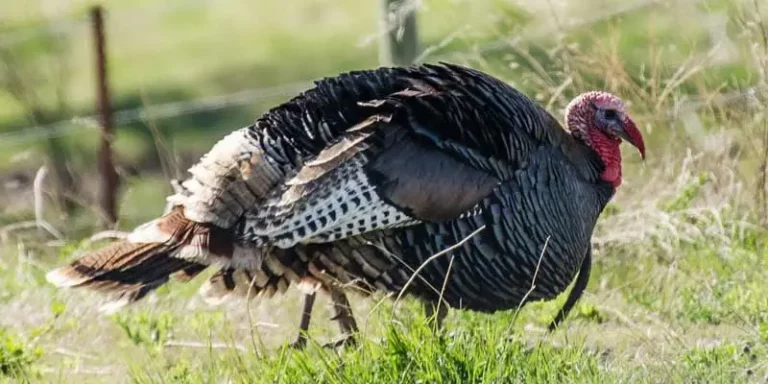The wild turkey is a big bird. It can weigh up to 30 pounds, with a wingspan of 6 feet. The males have large spurs on their legs that they use during mating season to fight other males and defend their territory.
Wild turkeys can be aggressive and may attack humans if they feel threatened or cornered. They’ve been known to attack people who get too close while they’re feeding or tending to their young.
The birds also have sharp claws and beaks, which can cause serious injury if they lash out at someone.
How Dangerous Are Wild Turkeys?
Wild turkeys are not aggressive by nature, but they can become defensive if they feel threatened or cornered by a human or another animal. If you’re attacked by a wild turkey, try to stay calm and remain still until it loses interest in you.
If you’re attacked in your home by an aggressive male turkey, try to stand as tall as possible with your arms raised above your head to appear larger than the bird (imagine holding an umbrella). This will often scare off the bird without causing injury to either party involved.
What Makes Wild Turkey Dangerous?
Below are some of the things that make wild turkey dangerous:
Wild Turkeys Have Sharp Claws and Beaks
Wild turkeys have sharp claws and beaks, so if you allow them to get close enough, they can do some damage.
Wild Turkeys Are Big
Wild turkeys are big birds, with the largest of them reaching over 30 pounds. A full-grown turkey has a large body, long legs, and a broad tail. The male is called a gobbler and the female is called a hen.
The male’s distinctive head feathers are called a beard and he also has fleshy wattles hanging from his neck. These bare patches of skin turn bright red during mating season.
Wild turkeys have an excellent sense of sight and hearing but they have poor eyesight in low light conditions. Their bill is flat, wide, and has no nail on it so they can’t pick things up with their beak-like some other birds do.
Wild Turkeys Are Fast
Turkeys don’t fly but they can run fast for short distances so if you see one running away from you or running toward you across open ground, it’s best to give it plenty of space because it may be trying to get away from something that could harm it or trying to get somewhere safer than where it is now.
Male Turkeys Are Aggressive During Mating Season
Male turkeys are aggressive during mating season. They will chase, peck, and sometimes kill other males who approach their hens.
Male turkeys are more aggressive than females, and they have larger spurs on their legs. The spurs are sharp, bony protrusions that can cause serious damage to another turkey’s body if the male stabs him with them.
Male turkeys try to mate with as many hens as possible during mating season, which begins in April and ends in June. During mating season, you may see several male turkeys chasing one hen around your yard. This is normal behavior for a male turkey during mating season.
During the mating season, turkeys are extremely dangerous and you should stay clear of them.
You Should Not Feed Wild Turkeys
There are many reasons why you should never feed wild turkeys. First, it can actually be illegal in some areas. Second, feeding wild animals changes their behavior and may encourage them to approach humans more often than they normally would. If you feed a group of wild turkeys once, they may come back, again and again, looking for handouts.
Once they get used to humans giving them food, they might start approaching people who don’t want to share their food with them. This is especially dangerous if there are small children around who might not be able to run away from a hungry turkey if it attacks them!
Feeding wild turkeys also makes them less afraid of humans which means that they will be more likely to attack people when they feel threatened or when they feel like defending their territory from humans encroaching on their land – either intentionally or unintentionally through development or changing land-use practices (for example: cutting down trees or building).
What To Do When You Are Attacked By Wild Turkey
Wild turkey attacks are not common, but they do happen.
There are a few things you can do to ensure your safety and avoid injury if you are attacked by a wild turkey.
Get out of the way if possible. If you can get away from the attacking turkey, do so immediately. Wild turkeys have sharp beaks that can inflict serious injuries. They also have spurs on their legs that they use as weapons when fighting with other males during mating season.
If you cannot get away from the attacking turkey and it continues to attack you, protect yourself by throwing things at it or hitting it with a stick or rock. If this does not work, try kicking at its legs or feet to make it back off from you.
Conclusion
There is reason to fear wild turkeys, but they are unlikely to cause any harm if you respect them and avoid doing things that threaten them.


